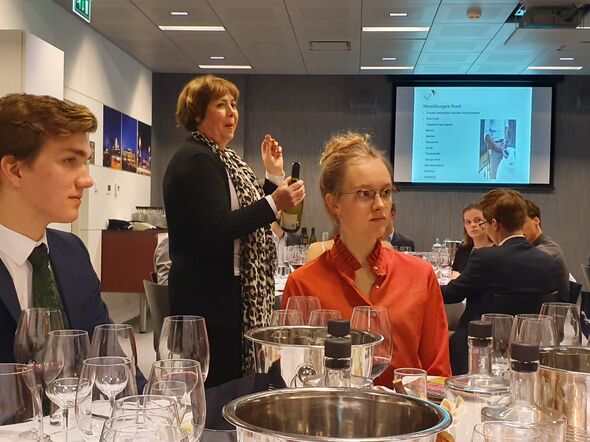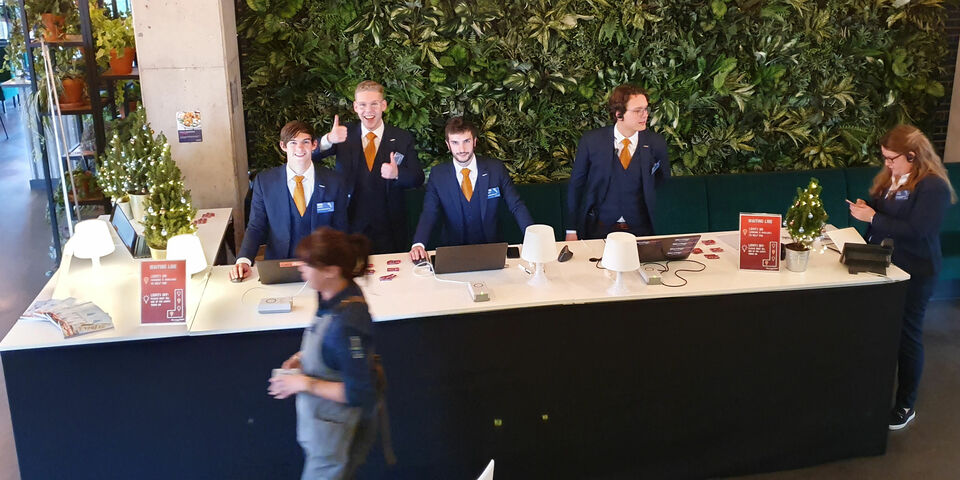Getting to know yourself at Skill Sessions
Demand has outstripped supply at the sixty-two Skill Sessions being organized by Wervingsdagen ('TU/e career events'). With training sessions on stress management, presentation skills and even on knowing your wines, students are keen to boost their skill set and face the job market - whenever that may be - well prepared. Finding the time isn't easy, in these busy weeks leading up to Christmas. Cursor looked on in the lessons on stress, lies and wine.
The chair of Wervingsdagen ('TU/e Career events') puts it like this: “The knowledge that you acquire at this university only really comes to fruition in combination with your own unique skills and creativity when you really know yourself and your capacities.” And students are certainly keen to get to know themselves, judging by the number of registrations for the Skill Sessions organized by the Wervingsdagen team.
Some 1,500 students, from bachelor's to graduating students, have registered 4,000 times for the training sessions. Boris Zwaan, chair of the 39th board, is very pleased. “In total, we have space for some 1,700 students at 62 workshops. So plenty of lots will have to be drawn. To the best of our knowledge this is the Netherlands' biggest training event for students. These training sessions are also offered at other universities, there's the Delft Business Days and the Twente Business Days for example, but elsewhere the scale is somewhat smaller than it is here.”
Dealing with stress
On Monday morning Irene Lensen is attending the training session 'Dealing with stress'. She is in the process of graduating from Biomedical Engineering, and has been “for an entire academic year”, and it is causing her quite a lot of stress. Reason enough to move an appointment with her graduation supervisor in order to come to this session offered by Annemarie Vaarkamp of De Laat Kenniscentrum. She is getting tips: ‘Make sure you take physical exercise in order to relax (relaxation through exertion), are sleeping well (without alcohol) and, most of all, 'know what is going on with you'. “Become aware of what stress does to you,” says Vaarkamp. She says it's a mistake to think that you shouldn't allow yourself to rest until your jobs are done. “It's vital that you get some mental rest and relaxation, of the kind you get when you do sport. This allows you to recharge your batteries so that you can perform at other times.”
According to the coach, when it comes to dealing with stress, there is much to be gained from having the right mental attitude. She is pleased with the example given by a participant: “I was attending a presentation that was really interesting, but it overran - I could see the clock ticking round and I had another meeting to go to. My heart rate went up, I felt harried, stopped paying attention and thought how dumb it was that I had another meeting.” The coach calls this ‘being terrorized by your thoughts’. She asks what happened next. “Well, I arrived too late and I said sorry. It wasn't a problem.”
Dealing with lies
Another sort of self-knowledge is offered to participants of 'The power of honesty'. Session leader Jan Reinder Rosing aims to make it easier to handle lies. What is a lie, what does it do to you, and when is it okay to lie? Rosing, co-founder of Project Wisdom and formerly a diplomat with the Ministry of Foreign Affairs, has students do an exercise in which they lie. They tell each other two stories, one of which is true, the other not. “It is difficult to lie, but it soon gets easier,” says one student of the experience. By Monday afternoon Rosing wants students to be rid of the moral judgment that lying is wrong per se. “Students shouldn't be tied to the norm; they should discover their personal standpoint as regards a lie.”

Dealing with wine
Most of the training sessions are held in Vertigo and De Zwarte Doos, but for the 'Dining Etiquette' series the Pullman Hotel is the venue. During the 'Wine Etiquette' workshop on Wednesday evening, wine lecturer Mea Gerrits tells (almost) everything there is to know about the “centuries-old drink that still manages to fascinate us”. It is Wednesday evening. Seated at each of the four beautifully laid tables are eight students, all dressed in international standard business attire, more appealing known as tenue de ville in both French and Dutch.
Gerrits speaks at length without pause, giving tips on posture, which dishes go with which wines, and ways of describing wine, while the students have no time to waste testing seven wines. “Hold the glass by the stem, not by the bowl. The mouth is warm, the liquid is cold,” says Gerrits during the white wines. “When making a toast, the glass shouldn't be raised higher than your nose. Do not down it in one go!”
When we come to the red wines: “Rhone wine is always spicy, the region has gravelly soils, and you can taste it. Goes well with a strong flavor like jugged hare. A brie or other 'runny cheese' doesn't go with red wine, the tastes clash in your mouth. Hard cheeses are a good accompaniment.”
Wine is talked about in positive or neutral terms, teaches Gerrits. “A pleasant wine, a rough or smooth finish. A wine is not acidic, but dry.” Wine Etiquette is a Skill Session you'll be proud of back home. And this certainly applies to the student who gave this reason for taking part: “I want to understand why my in-laws serve a different wine with every course at Christmas dinner.”


Discussion